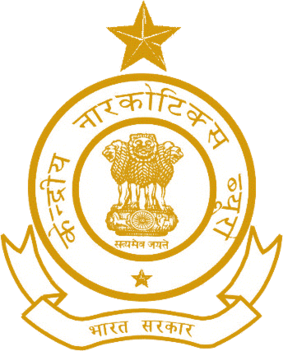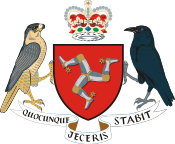
Customs is an authority or agency in a country responsible for collecting tariffs and for controlling the flow of goods, including animals, transports, personal effects, and hazardous items, into and out of a country. Traditionally, customs has been considered as the fiscal subject that charges customs duties and other taxes on import and export. In recent decades, the views on the functions of customs have considerably expanded and now covers three basic issues: taxation, security, and trade facilitation.

HM Customs and Excise was a department of the British Government formed in 1909 by the merger of HM Customs and HM Excise; its primary responsibility was the collection of customs duties, excise duties, and other indirect taxes.

Mec Vannin is a political party operating in the Isle of Man. Formed in 1962, it seeks to revoke the status of Man as a British self-governing Crown dependency and establish a completely sovereign state, which would be a republic.

A customs officer is a law enforcement agent who enforces customs laws, on behalf of a government.

The Hong Kong Customs and Excise Department is the customs service of the Hong Kong Special Administrative Region. The agency was established to protect Hong Kong from smuggling, ensure the collection of duties on taxable goods, detect and prevent drug trafficking and abuse, safeguard intellectual property rights, protect consumer interests, facilitate legitimate business and uphold Hong Kong's trade reputation, regulate money service operators and dealers in precious metals and stones, and combat money laundering and terrorist financing.

The New Zealand Customs Service is a state sector organisation in New Zealand whose role is to provide border control and protect the community from potential risks arising from international trade and travel, as well as collecting duties and taxes on imports to the country.

A bonded warehouse, or bond, is a building or other secured area in which imported but dutiable goods may be stored, manipulated, or undergo manufacturing operations without payment of duty. They may then be again exported without payment of duty. It may be managed by the state or by private enterprise. In the latter case a customs bond must be posted with the government. This system is widely used in developed countries throughout the world.
VAT-free imports from the Channel Islands to the United Kingdom took place for a few years during the early 21st century as a result of low-value consignment relief (LVCR). This is a tax relief that applies to low-valued imports to the European Union, exempting them from value-added tax (VAT). Although the UK was a part of the EU from 1973 until Brexit in 2020, the Channel Islands were not and, unlike the UK, they did not charge VAT on purchases. The UK government applied LVCR to imports from the Channel Islands, resulting in the construction of distribution centres on the islands and the export of many low-valued goods from there to the UK. The practice was unilaterally brought to an end in April 2012 by HM Treasury, the finance department of the UK government.

The Council of Ministers is the principal executive organ of the Isle of Man Government. Its role is similar to, though not identical with, that of the Cabinet in the United Kingdom. Until 1990, its title was the Executive Council.

The Isle of Man Government is the government of the Isle of Man. The formal head of the Isle of Man Government is the Lieutenant Governor, the personal representative of the Lord of Mann. The executive head is the Chief Minister.

The Isle of Man Post Office, which formerly used the trading name Isle of Man Post, operates postal collection, ancillary mail services, philatelic goods and delivery services and post office counter services on the Isle of Man.
The Common Purse Agreement entitles the Isle of Man to a share in the United Kingdom's Customs and Excise revenues in return for being in customs union with the UK and not charging any import duties on goods from the UK, or that have been imported through the UK.

The Department of Agriculture, Fisheries and Forestry or DAFF is a former department of the Isle of Man Government.

The Department of Education, Sport and Culture is a department of the Isle of Man Government.

The Royal Malaysian Customs Department ; is a government department body under the Ministry of Finance. RMCD functions as the country's main indirect tax collector, facilitating trade and enforcing laws.

The Bundeszollverwaltung is the customs service of the Federal Republic of Germany. It is also the executive and fiscal administrative unit of the federal government and part of the Federal Ministry of Finance. It was founded in 1949 in West Germany. The purpose of the Customs Service is to administer federal taxes, execute demands for payment on behalf of the federal government and federal statutory corporations, monitor the cross border movements of goods with regard to compliance with bans and restrictions, and prevent illicit work.
When goods are imported into a European Union country from a non-EU territory, those goods may be subject to customs duty, excise duty and value-added tax.

Central Bureau of Narcotics (CBN) is affiliated with India's Department of Revenue (IRS) and regulated by the country's Central Board of Indirect Taxes and Customs. The main function of CBN is to stop opium production and trade, and to issue licences for production of legal synthetic drugs. The Central Bureau of Narcotics headquarters is located at Gwalior.
A customs declaration is a form that lists the details of goods that are being imported or exported when a citizen or visitor enters a customs territory. Most countries require travellers to complete a customs declaration form when bringing notified goods across international borders. Posting items via international mail also requires the sending party to complete a customs declaration form.

The United Kingdom–Crown Dependencies Customs Union or customs arrangements with the Crown Dependencies is a customs union that covers the British Islands.












